After Operation Shield and Arrow came to an end, the BBC Jerusalem bureau’s Tom Bateman travelled to the Gaza Strip. The result of that trip was a report published on the BBC News website’s ‘Middle East’ page on May 17th which was promoted as follows:
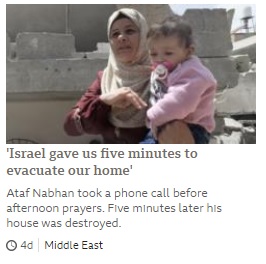
The report itself is headlined ‘Israel-Gaza: Palestinian family left homeless after strikes’. Like all earlier BBC News website written reports on that operation, it is tagged with the name of one party to the conflict – Israel – but not with the name of the terrorist organisation – Palestinian Islamic Jihad – which initiated the recent round of violence by firing rockets at Israeli civilian communities the previous week.
Bateman’s report relates to a residential building in Jabaliya which – along with several others in various locations in the Gaza Strip – housed a PIJ command centre. On the day that the building that is the topic of Bateman’s report was targeted after residents had been warned in advance, the Times of Israel reported as follows:
“The IDF also continued to carry out airstrikes against Islamic Jihad targets, hitting at least ten command centers used by the terror group to plan and carry out rocket attacks on Israel, as well as dozens of rocket and mortar launching sites.
Many of the command centers hit by the IDF over the past few days have been located within residential buildings, leading the military to notify residents to clear the area before it carries out the strike.”
Bateman’s report however focuses less on the fact that the IDF contacts civilian residents in buildings used by terrorist organisations in advance of strikes in order to prevent civilian casualties than on the alleged five-minute time slot. The caption to the main photograph illustrating his report reads: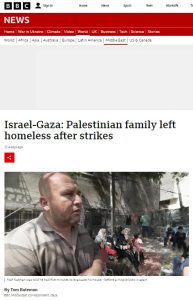
“Ataf Nabhan was told he had five minutes to evacuate his house – before a missile blew it apart”
The report opens:
“Kamal Nabhan was screaming as he thrust the phone into his cousin’s hands, unable to believe what the anonymous caller was telling him.
The men had just got ready to go to afternoon prayers in Jabalia refugee camp. But the routine patterns of life were about to give way to violent destruction, wrought from above with a warning call.
Kamal’s cousin Ataf reached out to his relative.
“I took the phone from him and talked to the person on the line,” says Ataf. “He said he was from Israeli intelligence, and you have five minutes to evacuate the house.”
They began to rush back, telling the Israeli caller he must be mistaken because the building “was full” of disabled people. “[The intelligence officer] said: ‘No, immediately evacuate the house,'” says Ataf.”
Readers are not informed how Bateman and his team came to report from that particular building in Jabaliya but the fact that other outlets including Reuters and AP produced remarkably similar reports from the exact same location around the same time suggests that the media focus on a building with several disabled residents is not a coincidence.
The Israeli practice of giving advance warnings ahead of strikes on terrorist assets is presented by Bateman using the qualifying ‘Israel says’ formula. In contrast, he unquestioningly promotes unsubstantiated claims concerning “international law” from unnamed “human rights groups” along with unverified ‘beliefs’ from unidentified “local sources”. [emphasis added]
“Just before a ceasefire deal was agreed late on Saturday, Israel destroyed several other residential blocks in similar circumstances – giving warnings to evacuate residents before bombing the buildings. These strikes that bring down whole apartment blocks are a well-worn tactic in its attacks on Gaza.
Israel says the buildings it hit were used as “command and control centres” by Islamic Jihad to direct rocket launches. It said its warning calls were meant to prevent harm to uninvolved civilians.
Local sources believe a militant lived in the building but not that it was an operational centre. Human rights groups condemn such attacks destroying entire residential blocks as a violation of international law. Another resident who received a warning call was filmed pleading with Israeli forces to limit any attack “to the apartment of the guilty”.”
Relating to the date on which the building in Jabaliya was struck, Bateman tells readers that: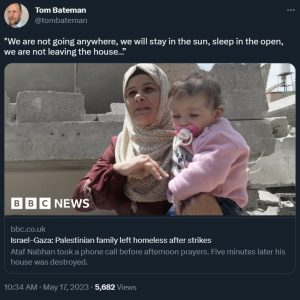
“It was day five of the fiercest Israeli air strikes on Gaza in nine months. The campaign of so-called targeted assassinations killed at least six leading figures in Islamic Jihad, the Palestinian territory’s second most powerful militant organisation.
But the attacks also killed 10 civilians on the first night alone – including wives and children of some of the men targeted as they slept. The group retaliated with waves of rocket attacks on Israeli cities, forcing tens of thousands to take cover in bomb shelters.”
As noted here previously, all the ten civilians killed on May 9th were were either family members or neighbours of the three Palestinian Islamic Jihad commanders targeted on that day.
Bateman’s claim that “tens of thousands” of Israelis had to “take cover” from rocket attacks is of course a gross underrepresentation of the number of people affected. He continues with a portrayal which, like previous BBC reports, fails to clarify that twenty of the thirty-three fatalities were members of terrorist organisations and at least three were killed by missiles launched by terror groups in the Gaza Strip which fell short of the border:
“Last week’s fighting killed 33 Palestinians in Gaza and two people in Israel – an Israeli and a Palestinian. It left more than 1,200 Palestinians displaced, according to the UN.”
Readers are not informed how many Israelis were displaced due to Palestinian rocket attacks on their homes. The apartment building in Rehovot where 80 year-old Inga Avramyan was killed and five others wounded, for example, is to undergo structural work in order to make it habitable again. It is nevertheless highly doubtful that BBC audiences will see any reporting on the topic of the displaced Israeli civilians who of course did not receive any warning whatsoever from Palestinian terrorist organisations before their homes – which did not house military assets – were hit by rockets.
Related Articles:
BBC NEWS WEBSITE REPORTING ON PIJ HUNGER STRIKER AND ROCKET ATTACKS
OVERVIEW OF BBC NEWS WEBSITE REPORTING ON CASUALTIES IN ISRAEL
BBC PORTRAYALS OF SHORTFALL MISSILES AGAIN COMPROMISE AUDIENCE UNDERSTANDING

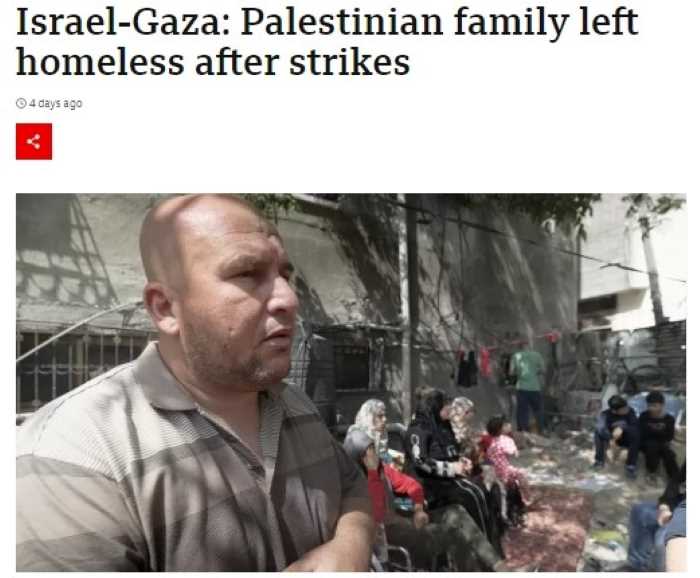



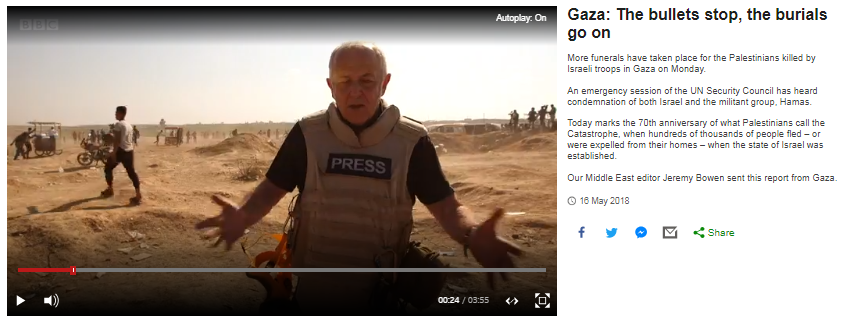
Bateman should have less than the 90 seconds Israelis get when rockets/missiles are fired from Gaza – perhaps he has failed to realize that 5 whole minutes, yes 300 seconds is at least a magnitude of three more than the period Israelis get – but to the BBC once again Jewish lives don’t matter. They are a disgrace for how they handle such material and then shove Batemans lies out as honest truth!